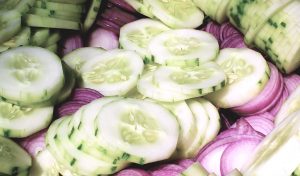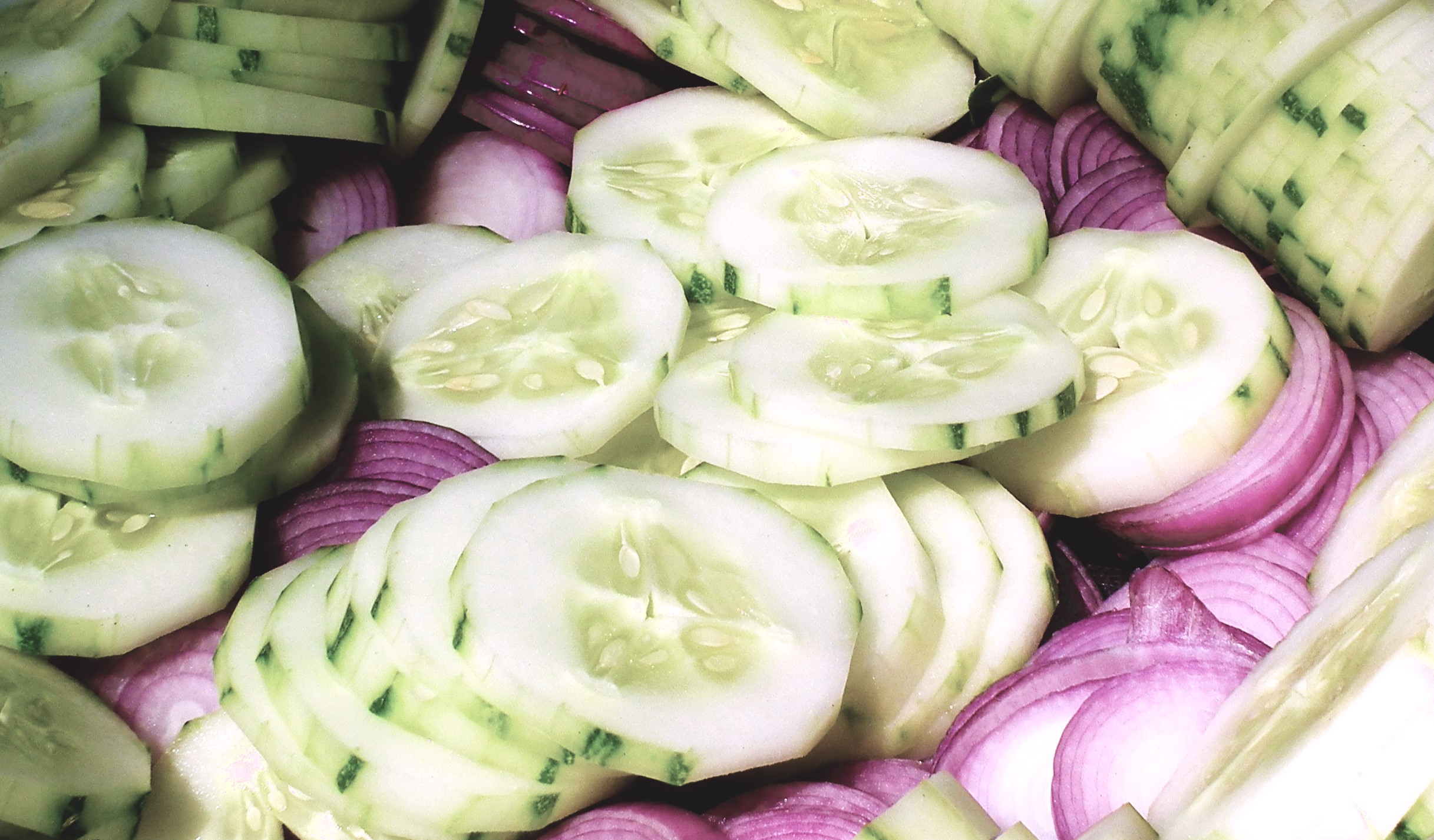
The pasuk says: “We remember the fish that we ate in Egypt free of charge, the cucumbers, melons, leeks, onions, and garlic” (Bamidbar 11:5). The people were ostensibly crying over the food that they missed while they were in the Wilderness. Rashi quotes the teaching of Chazal that they were not really crying over the fish, cucumbers, garlic and onions, but rather they were crying over “family matters.” They were bemoaning the fact that they recently became forbidden in the arayos prohibitions.
Rav Yaakov Kamenetsky shares a very basic idea over here (as he does in two other places in his Chumash commentary). He asks, how do Chazal know this? The simple reading of the pasuk is that they were crying over food deprivation. Chazal say that rather than crying over food, they were really crying over the newly-given arayos prohibitions. There is no indication of such in the pasuk, so how do Chazal put words into the mouths of the Jews in the Wilderness that appear nowhere in the p’shuto shel Mikra?
Rav Yaakov answers that there is a concept in Torah interpretation called “PaRDeS“. PaRDeS is an acronym which represents the Torah being understood on several different levels—the level ofPshat(simple interpretation), Remez (hidden allusion), Drash (homiletic exposition), and Sod (mystical interpretation). So too, he says, human beings need to be understood on different levels. When a person says something, it needs to be analyzed at the level ofPshat, at the level of Remez, at the level of Drush, and at the level of Sod. Many times, people don’t really understand their own words on the subconscious level.
Sometimes something much deeper is really going on than the face value of someone’s words. People don’t really cry about fish and cucumbers—especially when they have mann falling from Heaven on a daily basis. The mann was the best food in the world. According to Chazal, it could taste like whatever the person consuming it desired. So obviously, no one’s taste buds were being deprived by a lack of garlic or onions. Either through Ruach HaKodesh or some other means, Chazal realized that something much deeper than onions was motivating them over here. This is what Rav Yaakov calls “Klayos v’Lev” (literally kidneys and heart), which is a Rabbinic idiom for what we call the subconscious. In other words, they were not even aware themselves of what was really bothering them.
This occurs all the time with interpersonal relations—with our children, our spouses, our employees and our employers. Sometimes a person has a “fit” about something and we ask him, “Why are you having a fit about this? It is such a trivial issue (whatever it may be). Why are you having a fit about this?” Sometimes the answer is that something else is going on. It is not the onions. It is something else.
Rav Yaakov says the same thing in Parshas Lech Lecha. Lot said he wanted to separate from Avraham Avinu and go live in Sodom. Why did he say that he wanted to go live in Sodom? It was because “Sodom was a fertile lush valley” (Bereshis 13:10). Rashi there cites a Medrash Aggadah that Lot’s real interest in moving to Sodom was because they were an immoral and licentious people. He desired to live in a region where the residents had an “everything goes” lifestyle.
Rav Yaakov asks the same question there: Why do Chazal attribute such amoral intentions to Lot? Where do Chazal see this motivation? Why not assume that Lot is going there to make a better living in the fertile region? Rav Yaakov explains the same idea: Lot was with Avraham Avinu. Not only was he with Avraham Avinu, which is a tremendous merit, but he made an economic fortune by virtue of having attached himself to Avraham. “Also, Lot, who went with Avram, had flocks, cattle, and tents.” (Bereshis 13:5) So if he wanted to make a good living, he should have stayed with Avraham Avinu! Why then is Lot migrating to Sodom? The answer is that it is for some unverbalized reason. It is not for parnassah!
There is an old quip: “We say the Hagaddah, but we want the Kneidlach.” It was the same thing over here: We say “Parnassah, paranassah,” but it is not really parnassah. Now, Lot may not have even realized this himself. That is the nature of the PaRDeS of human conversation—there isPshat, Remez, Drash, and Sod behind each of man’s comments. Lot may not have fully understood what he was saying, and neither do we fully understand everything we say.
Sometimes we get upset about something. We need to ask ourselves, “Why am I so upset?” Sometimes we don’t even realize it. “Why should this bother me so much? It is such a minor issue!” We need to ask ourselves: “What is really bothering me?” We see this by the cucumbers and onions. We see this by Lot. We always need to ask the question: What is really motivating us?
The Ish Moshe Was More Humble Than Any Adam
The Torah testifies: “And the ‘Ish‘ Moshe was extremely humble, more so than any ‘Adam‘ on the face of the earth” (Bamidbar 12:3). In Lashon HaKodesh, the word “Ish” (literally – ‘man’) always connotes a distinguished individual, a person who has accomplished something important in his life. The word Adam (also meaning ‘man’) connotes any human being.
Rav Nissan Alpert, zt”l, points out that this pasuk apparently lacks symmetry. Rather than comparing the ‘Ish‘ Moshe with any ‘Adam‘, the pasuk should have used the plural of the word ‘Ish’ (Anashim) and state that the Ish Moshe was humbler than any Anashim on the face of the earth.
Rav Nissan Alpert explains that the pasuk is telling us that Moshe Rabbeinu was haIsh Moshe—the most accomplished person in the world, an Ish haElokim. He had what to be haughty about! And yet, he was humbler than even the simplest unaccomplished Adam anywhere in the world!
The Gemara (Sotah 5a) says that a person should learn a lesson from his Creator. The Holy One Blessed be He abandoned all the higher peaks in the world and had His Presence descend onto a relatively lowly mountain upon which He gave His Torah (i.e. – Mt. Sinai).
The Kotzker Rebbe once asked, if the Almighty wanted to teach us humility, why didn’t He give the Torah in a valley? The answer is that true humility occurs when someone has something to brag about and nevertheless remains humble.Hashemgave the Torah on a mountain. If someone is a nothing (e.g. – a valley) and does not act haughty about it, that is no big deal. However, when a person has what to be gayvedik about (for example, a mountain) and nevertheless remains humble, that is a big deal! Therefore, the Almighty gave the Torah on a mountain, but on a humble mountain.
Similarly, that is why there is a principle that the Divine spirit of prophecy descends upon people who are strong, wealthy, wise, and tall. What is the reason for that? It is because the Ribono shel Olam wants people to remain humble, despite having qualities that can legitimately cause them to be proud, or even haughty.
Transcribed by David Twersky; Jerusalem DavidATwersky@gmail.com
Technical Assistance by Dovid Hoffman; Baltimore, MD dhoffman@torah.org
This week’s write-up is adapted from the hashkafa portion of Rabbi Yissochar Frand’s Commuter Chavrusah Series on the weekly Torah portion. A listing of the halachic portions for Parshas Beha’aloscha is provided below:
- 015 Reinstituting the S’micha
- 060 Waiting Between Meat and Milk: Adults and Children
- 104 The Seven-Branched Menorah
- 149 Bringing the Sefer Torah to a Temporary Minyan
- 196 Vegetarianism
- 242 Military Service and Potential Halachic Problems
- 286 When Do We Stand in Honor Of a Sefer Torah?
- 332 Tefilas Tashlumin: Making Up a Missed Davening
- 376 Davening For A Choleh
- 420 Fish and Meat
- 464 Honoring Levi’im
- 508 The City of Yericho
- 552 Kavod Sefer Torah Vs Kavod Talmid Chochom
- 596 Sitting on Top of Seforim
- 640 Lox and Cream Cheese
- 684 Kissing A Sister
- 728 Lechem Mishna Revisited
- 772 Simchas Shabbos – Is There Such a Thing?
- 816 Niduy – Excommunication
- 860 Standing For A Sefer Torah On Simchas Torah
- 904 Women and Birchas HaGomel
- 948 The Ba’al Shacharis Who Forgot Maariv
- 991 The Shabbos Bar Mitzva in the Good ‘Ole Summertime
- 1035 Davening that the Suffering Patient Should Die – Permitted or Not?
- 1079 Does A Grandfather Have To Pay For His Grandson’s Tuition?
- 1122 Meat and Fish – Must You Have A Separate Fish Pot?
- 1164 Davening For A Choleh: Must You Mention Father’s or Mother’s Name?
- 1252 The Dilemma of the Baalas T’shuva at her Non-Frum Brother’s Wedding
- 1296 Should You Daven for the Same Choleh Over and Over Again?
- 1340 Bringing a Sefer Torah to the House of an Avail or Temporary Minyan
- 1384 Can You Be Mechallel Shabbos To Send A Kevital To A Rebbe?
- 1428 Health Care Professionals – Treating and Touching People of Opposite Gender: Problem?
- 1472 Davening for a Choleh: Should You Use the Person’s Father’s Name or Mother’s Name?
A complete catalogue can be ordered from the Yad Yechiel Institute, PO Box 511, Owings Mills MD 21117-0511. Call (410) 358-0416 or e-mail tapes@yadyechiel.org or visit http://www.yadyechiel.org/ for further information.



